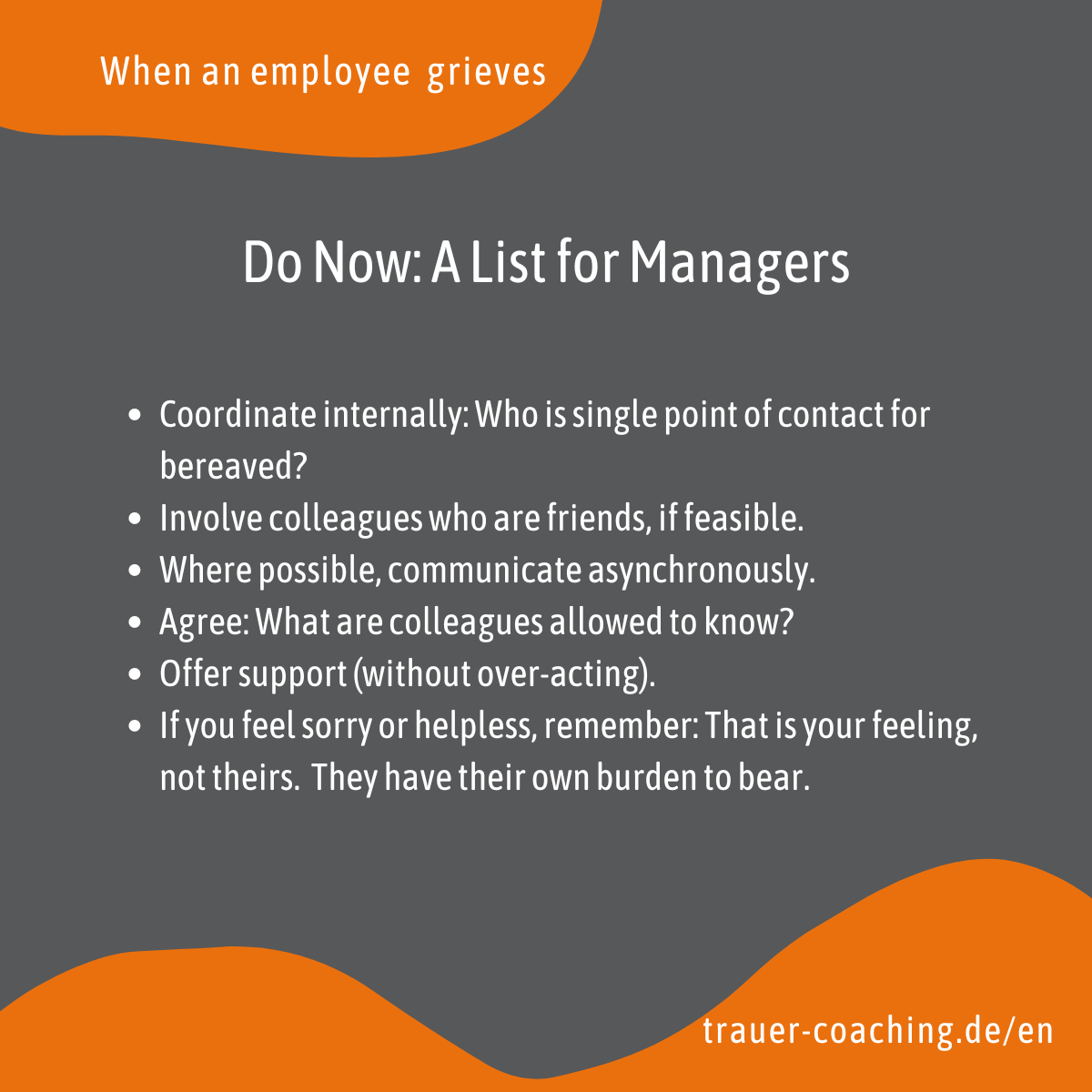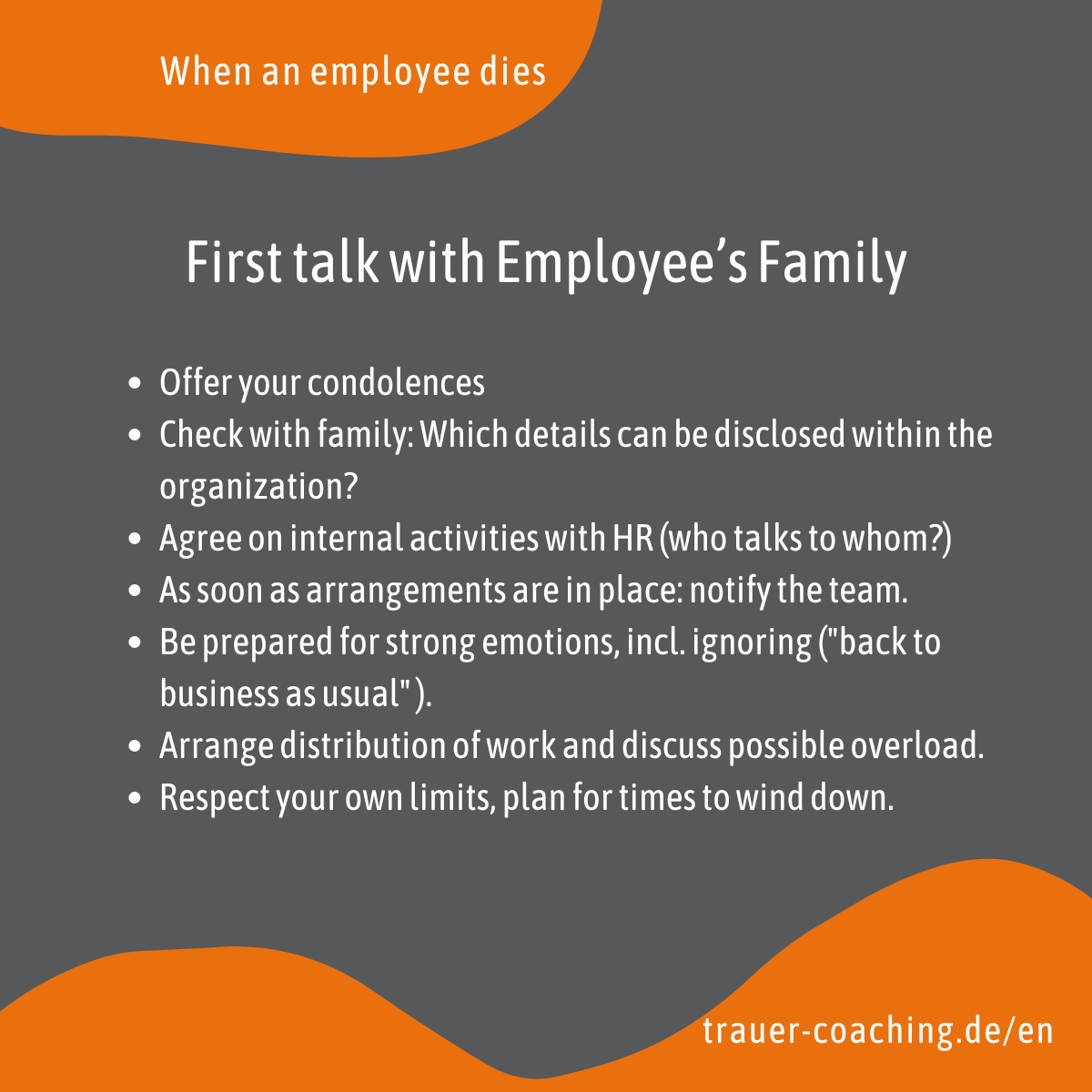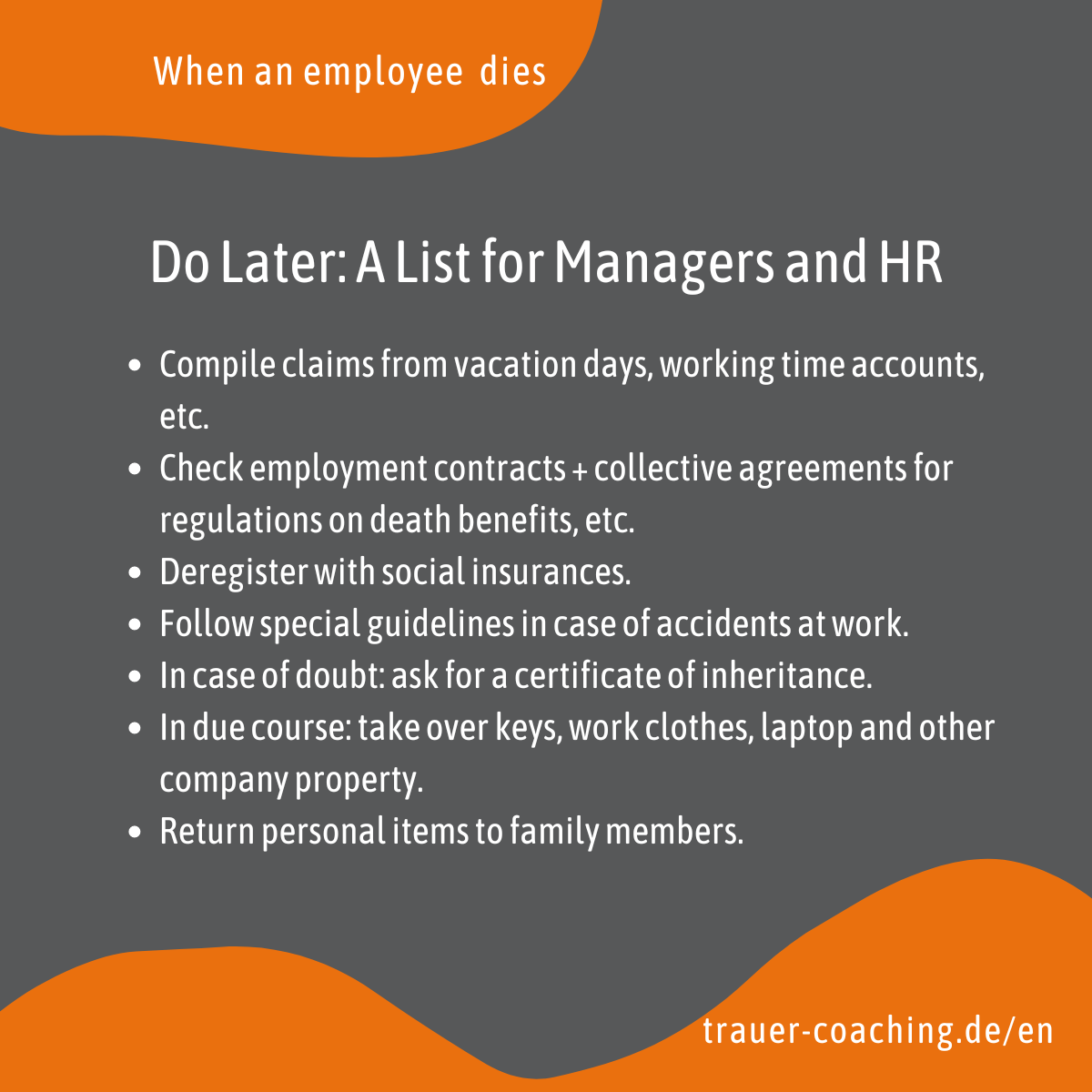
When an Employee Dies: What needs to happen?
An employee dies. What needs to be done from the company's perspective?
Der Artikel verlinkt auf Vorlagen und Mustertexte, Checklisten und Artikel zu Einzelfragen, die beim Tod eines oder einer Mitarbeitenden für HR-Experten, die Unternehmensleitung und speziell die Führungskraft des_der Verstorbenen hilfreich sein können.
Part 2 of this series shares guidelines for internal communication. Part 3 offers tips for colleagues. Part 4 centers on the situation when an employee or colleague experiences a loss in his personal life.
The podcast episode on “grief in the workplace ” in German, only.
An employee dies. Shocked and a certain speechlessness may prevail in the first moments. Questions you might ask yourself as a manager or HR expert: How do I behave? What do I have to do? And what does the HR department have to do? And - maybe as an afterthought: Does this affect me?
This article focuses on the pending tasks of HR and managers when an employee dies. Here is an article with tips for internal communication around an employee's death with direct colleagues / a team, the wider organization and customers or partner as well as with the deceased's family.
Please be aware that this article mentions details for a German setup. Some thoughts might be applicable for other countries, but requirements will vary.
Be prepared and prep your organization for cases of bereavement and personal crisis:
♦ Workshop on Grief-Management ♦
Deceased Employee: What Do We as the HR Department Have to take care of?
Please refer to this section for links and infos from a German perspective on:
- Remuneration, vacation and working time accounts, regulations from collective agreements and employment contracts
- Deregistration from social insurance
- Special Case: Occupational Accident
- Return of company property as well as the deceased's property
Death of employee: Checklist on remuneration (with links)
Employees in HR departments face a number of tasks after the death of an employee.
Please find a detailed checklist for German cases on sekretaria.de (in German, though). Here is a brief summary in English:
- Outstanding payments: This includes but is not limited to remuneration up to the date of death, payment of outstanding vacation entitlements or from working time accounts. Also: Check if dependants' are entitled to company pensions. Please find checklist-type overviews in German at haufe.de and anwalt.de
- Depending on the collective agreement (Tarifvertrag) or employment contract, surviving dependants may be entitled to additional benefits, e.g. to cover the cost of a funeral.
- The deceased employee must be deregistered from social insurance, as the employment relationship ends upon death (see, for example, the overview in the TK lexicon).
Looking for advice in an acute situation?
Contact me at +49 179 2601797
Or send me a note at hallo [at] trauer-coaching.de
Occupational Accident
In the event of death due to an accident at work, special regulations might apply, e.g., insurance benefits or obligatory payments in some sectors (see the article at arbeitsvertrag.org). For detailed information on the professions in your own company, the employers' liability insurance associations (Berufsgenossenschaft) can help.
Depending on the setup, the HR department may be responsible for ensuring the return of work materials provided to the employer and personal items to the family. In addition to a laptop or cell phone, this includes keys, hard copies of documents, a company car or work clothes. Sensitivity with regard to timing is crucial here. There is no hard and fast rule, and if at all possible, it will certainly go down well with the bereaved if the request comes later rather than earlier.
One way of making contact is to offer to return personal items belonging to the deceased (e.g. from a desk or locker). One idea is to get in touch to convey that there are things to discuss - and make an appointment for another day. The thought behind this: Many acutely grieving people experience concentration problems. It can be helpful for them if they can prepare for the conversation and possibly have a "stable person" with them during the conversation, who can help them to remember and deal with things afterwards.
It is advisable to have the inheritance certificate presented in order to pay out inherited claims to the correct persons. The situation is different if the death benefit is paid out to the surviving dependants, as regulated in some collective agreements (for details, see the section on "Entitlement to receive benefits" at anwalt.de).
Contact with Family Members and Relatives
For contact with family members, it is worth taking a look at the considerations on communication in part 2 of this series.
The company's reaction - a test for the company's culture!
A discussion with an employment lawyer will provide additional clarity about what the employer must and cannot provide to the surviving dependants. And the legal side is not sufficient preparation: If and how the surviving dependants are offered benefits shows appreciation for employees - and is therefore first and foremost a question of corporate culture!
Vertiefung?
Sie möchten das Thema vertiefen? Und Ihre Organisation gut vorbereiten? Kontaktieren Sie mich für Ihren Workshop Trauer-Management.
What Managers Need to Do when an Employee dies
When an employee dies, the direct manager is often the first person to find out in the professional context, next to the HR department.
There are a few specific "duties". Mostly, not putting your foot in your mouth goes along way. In Human Resources Manager, Petra Sutor names seven traps that you want to avoid as a manager.

Opening space in your team for shock AND workload questions
As a manager, you will probably be the person who breaks the hard news of a colleague's death to the members of your team or department. This should be done as quickly as possible, and at the same time you (!) should take enough time to act with sensitivity.
At the same time, you are responsible for ensuring that important tasks are taken over or completed by another person and that upcoming tasks or projects are redistributed. It helps to ensure good timing and a presentation that does not seem irreverent,
- if you can assess the mood in the team: Does it fit when you bring up the topic of workload? Or do shock or sadness still need space?
- if you prepare well how you approach the topic: How do you justify when an important or urgent task should be quickly taken over by someone else?
- if you provide an outlook on how you will remedy the issue of workload (if necessary): How will the additional workload be distributed in perspective?
Show empathy in conversations with employees
When it comes to death and dying, behavior that is perceived as less than empathetic can quickly cost you the trust of team members. As a manager, you are the person who creates space for mourning or commemoration - or not. There is no one-size-fits-all rule for what teams or individual employees need.
- Rely on your knowledge about the individuals in your team and your team as a whole - AND take a close look at how they react in the situation.
- Then decide on the space you can give to shock and the commemorating.
- In case of doubt, ask what the colleagues concerned need for now.
Be aware of your own limits
Before you start, it's worth taking a look in the mirror: What do you need to do well for yourself? So you can be there for others.
After all, news of a death can upset anyone, even you. Ask yourself: Which person in your internal company network can you share your initial shock with? Is there perhaps a manager at the same level with whom you can discuss tricky issues and whose confidentiality you can rely on? You can also approach the company's formally appointed confidant or a coach with whom you work or have worked.
As soon as or when you are emotionally composed, a conversation with your manager or your HR contact person might be a good step. Consider if you would like to have this conversation before take another steps. That way, you won't end up in a situation that is difficult to reverse.
After this, start the communicating with employees as quickly as possible.



This is part 1 of a series of articles.
- This Part 2 adds shares guidelines for communication .
- Part 3 offers suggestions for employees after a colleague dies,
- Part 4 deals with the case when a colleague is grieving.
- In the Workshop on Grief Management , you prep your organization for actual cases.
Click here to see more